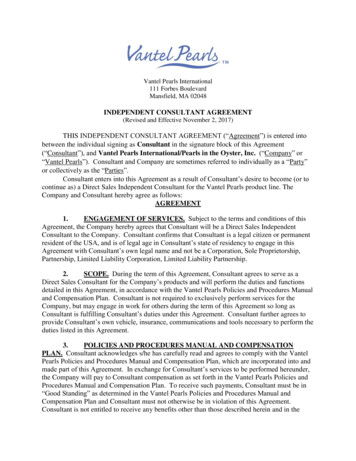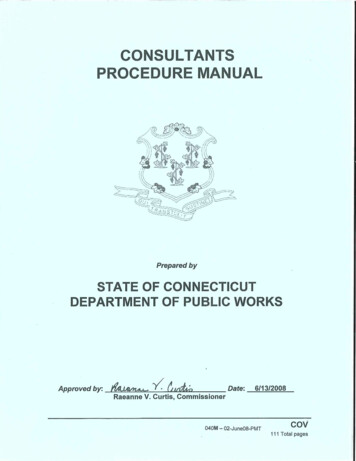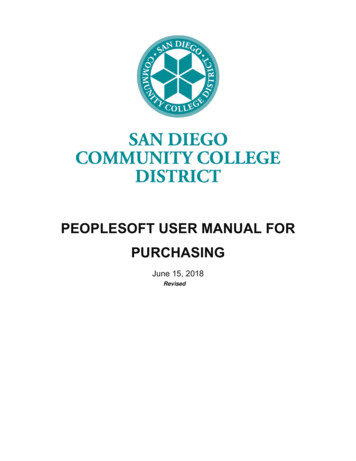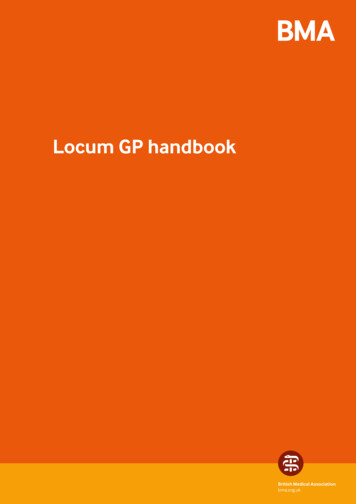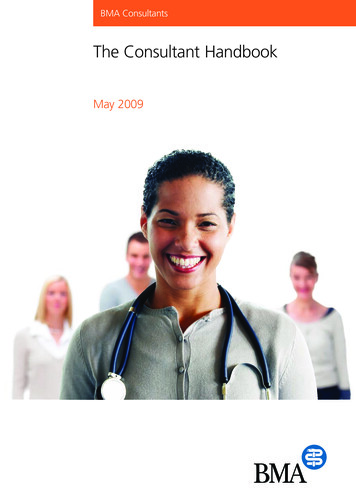
Transcription
BMA ConsultantsThe Consultant HandbookMay 2009
BMA ConsultantsContentsEmployment of consultants . . . . . . . . . . . . . . . . . . . . . . . . . . . . . . . 5The pre-2003 national consultant contract . . . . . . . . . . . . . . . . . . . 7The 2003 consultant contract . . . . . . . . . . . . . . . . . . . . . . . . . . . . 18Terms and conditions of service common to the two contracts . . . 35Job planning . . . . . . . . . . . . . . . . . . . . . . . . . . . . . . . . . . . . . . . . . 57European Working Time Directive (EWTD) . . . . . . . . . . . . . . . . . . 64Redundancy . . . . . . . . . . . . . . . . . . . . . . . . . . . . . . . . . . . . . . . . . . 68Pensions . . . . . . . . . . . . . . . . . . . . . . . . . . . . . . . . . . . . . . . . . . . . 72Clinical excellence awards (CEAs) . . . . . . . . . . . . . . . . . . . . . . . . . 80Private and independent practice . . . . . . . . . . . . . . . . . . . . . . . . . 87Working in the new NHS . . . . . . . . . . . . . . . . . . . . . . . . . . . . . . . 103Consultant appointments procedures . . . . . . . . . . . . . . . . . . . . . 106Disciplinary procedures and exclusions . . . . . . . . . . . . . . . . . . . . . 113Appraisal . . . . . . . . . . . . . . . . . . . . . . . . . . . . . . . . . . . . . . . . . . 121General Medical Council (GMC) . . . . . . . . . . . . . . . . . . . . . . . . . 131Health . . . . . . . . . . . . . . . . . . . . . . . . . . . . . . . . . . . . . . . . . . . . . 138NHS reform – Darzi Next Stage Review . . . . . . . . . . . . . . . . . . . . 148Workforce planning . . . . . . . . . . . . . . . . . . . . . . . . . . . . . . . . . . . 150Clinical academics . . . . . . . . . . . . . . . . . . . . . . . . . . . . . . . . . . . . 152The clinical team . . . . . . . . . . . . . . . . . . . . . . . . . . . . . . . . . . . . . 160Clinicians in management . . . . . . . . . . . . . . . . . . . . . . . . . . . . . 167NHS structure . . . . . . . . . . . . . . . . . . . . . . . . . . . . . . . . . . . . . . . 172Health and hospital records . . . . . . . . . . . . . . . . . . . . . . . . . . . . . 183The British Medical Association (BMA) . . . . . . . . . . . . . . . . . . . . . 190Acronyms . . . . . . . . . . . . . . . . . . . . . . . . . . . . . . . . . . . . . . . . . . 195Index . . . . . . . . . . . . . . . . . . . . . . . . . . . . . . . . . . . . . . . . . . . . . . 197This handbook applies to consultants working in England only.The Consultant Handbook 20091
BMA ConsultantsEmployment of consultantsNHS TrustsThe vast majority of consultants working in the NHS in England areemployed directly by Trusts, whether NHS Trusts, foundation trusts orprimary care trusts (PCTs). Each Trust is entitled to determine its owncontracts and terms of service for its employees, includingconsultants. However, very few NHS employers deviate significantlyfrom national agreements and the Department of Health (DH) expectsall NHS Trusts to offer the 2003 consultant contract to all consultants.It is possible, however, that the freedoms offered to foundation trustsmay result in some future divergence from national terms of service.With extended plurality of healthcare providers in the NHS, it is alsopossible that consultants will increasingly work for alternativeproviders or indeed as independent contractors to the service. Forconsultants who are working in this way, or considering doing so,BMA Business Support offers a suite of guidance on areas such asbusiness planning and tendering for contracts. This guidance formembers can be accessed here:www.bma.org.uk/about bma/benefits for members/bma business support/index.jspLocal and national negotiationsNational NHS terms and conditions of service are negotiated throughthe Joint Negotiating Committee for senior hospital doctors (JNC(S)).The committee normally meets twice a year to discuss and negotiateissues surrounding changes and/or additions to the national contracts.It includes representatives from the BMA, the DH and NHS Employers.Because of the autonomy NHS employers have for determining theirown contracts, the BMA has worked hard to ensure that medical staffhave appropriate local negotiating machinery in Trusts to complementthe national structures. The role of these local negotiating committees(LNCs) is to ensure that national terms and conditions of service areapplied, to provide a formal mechanism to negotiate any proposedchanges to local contractual arrangements and to negotiate aroundany local flexibilities that exist in national agreements. Theoverwhelming majority of Trusts have an LNC consisting of doctorselected by their colleagues to negotiate with Trust management.The Consultant Handbook 20095
BMA ConsultantsWhere LNCs have been set up according to BMA guidelines they areformally accredited by the Association. This means that they receiveadvice and support from BMA staff, and their members receivetraining in negotiating skills and are protected by trade union law.It is vital that members of the Association who are consideringappointment to a particular Trust request information on the termsand conditions of service that will apply. For advice and informationon consultant terms and conditions of service, contact askBMA.Consultant contractsThe following four sections of the handbook deal with contracts andthe terms and conditions of service for NHS employed consultants.There are two distinct employment contracts in England, but thereare some common terms of service, therefore, the handbook hasbeen divided up as follows: the pre-2003 national consultant contract – a small number ofconsultants appointed before 1 November 2003 retain this contractbut it is not on offer to new appointments the 2003 consultant contract – the vast majority of consultants andall new appointments are employed under this contract terms and conditions of service common to the two contracts job planning – job planning has been a theoretical requirement since1991 but the new consultant contract has placed more emphasis onit. There are common job plan themes for both contracts.See page 152 for information about clinical academic contracts.6The Consultant Handbook 2009
BMA ConsultantsThe pre-2003 nationalconsultant contractThe current form of the ‘old’ pre-2003 national consultantemployment contract was determined by an agreement in 1979between the DH and the medical profession and was set out in thehealth circular PM(79)11, in which three types of consultant contractare defined: the whole-time contract, the maximum part-timecontract, and the part-time contract. This contract has not beenavailable to newly-appointed consultants since 31 October 2003.Types of contractWhole-time and maximum part-time contract holders have an identicalcontractual commitment to devote substantially the whole of theirprofessional time to their NHS duties. Their contracts are termedprofessional in that they do not specify particular hours of work.However, a consultant enters into a job plan as part of the contractwhich sets out specific commitments that must be met (see page 57).The work commitment of a consultant is considered to be the samewhether the contract is whole-time or maximum part-time, that is, a‘full-time’ commitment to NHS duties. However, there is a formaldefinition in the terms of service only in respect of the maximum parttime contract, which is defined as a minimum of 10 notional half days(NHDs) where an NHD is defined as being three and a half hours flexiblyworked. Many contracts describe the commitment for whole-time andmaximum part-time posts in terms of the number of NHDs. Becausethere is no difference between whole-time and maximum part-timeappointments in this regard, ie a minimum of 10 NHDs, this could bemisleading or inaccurate. It is recommended that contracts state eitherwhole-time or maximum part-time rather than specifying the number ofNHDs. The key difference between whole-time and maximum part-timecontracts relates to the limitations placed upon private practice. (See‘Terms and conditions of service common to the two contracts’ forfurther details.)Whole-time contract holders are limited to deriving no more than theequivalent of 10 per cent of their gross NHS earnings from privatepractice. Maximum part-timers receive 10/11ths of the whole-timeThe Consultant Handbook 20097
BMA Consultantssalary, but are free to earn an unlimited income from private practiceand ‘category 3’ work (see page 14). A detailed examination of the ruleson private practice can be found on page 87.With the agreement of their employer, whole-time or maximumpart-time contract holders can voluntarily switch from one form tothe other, although the workload commitment remains unaltered.Change from whole-time or maximum part-time to part-time againcan only be with the agreement of the employer. The rules in relationto private practice income, as outlined above and described in detailon page 87, can require a whole-time consultant to move to amaximum part-time contract and limit his/her ability to revert towhole-time. In any event, consultants are advised to avoid anysuggestion that they are exploiting the provisions to move betweenthe different types of contract. Consultants may also enter intotemporary, non-pensionable contracts to work additional NHDs.Maximum part-time consultants can also include up to 30 minutesof travelling time each way from their home (or private consultingrooms) to work in their NHD calculations.Maximum part-time contract holders should also be aware that theirservice for pension purposes will be reduced. Part-time contractholders have a work commitment of between one and nine NHDs.Part-timers are paid 1/11th of the whole-time consultant salary foreach NHD plus the same proportion of any distinction award ordiscretionary points held. Unlike whole-timers and maximum parttimers, there is no contractual obligation on part-timers to devotesubstantially the whole of their professional time to the NHS. Thereis, therefore, no limit on the private practice income a part-timermay earn. All NHDs up to a maximum of 11 will be countedtowards pensionable service except those which are temporaryadditional NHDs (see page 10). The position of part-timers underthe new contract is covered on page 30.8The Consultant Handbook 2009
BMA ConsultantsFixed and flexible commitmentsUnder the pre-2003 contract, consultants’ NHDs are divided between‘fixed’ and ‘flexible’ commitments.Fixed commitmentsThese are regular scheduled NHS activities. They are formallydefined as those that substantially affect the use of other NHSresources, such as other staff or facilities. Examples of fixedcommitments include operating lists and outpatient clinics. Somework may or may not be a fixed commitment depending on whetheror not it is a regular scheduled activity. Fixed commitments should befulfilled, except in an emergency or with local management’sagreement, which should not be unreasonably withheld. Dependingupon the type of contract consultants hold, along with several otherfactors, the number of fixed commitments should be as follows:Whole-timers and maximum part-timers: normally between fiveand seven NHDs per week. Other part-timers, job-share contracts andhonorary contract holders: normally at least half of the NHDscovered by the NHS contract.In deciding upon the number of fixed commitments, all othercomponents of the job plan must be taken into account. It is recognisedthat the ‘normal’ number of fixed commitments may be varied with theagreement of the consultant and the medical director in the light of allother factors that are covered by the job plan. If, for example, aconsultant has onerous on-call rota commitments, with few juniorstaff, in a hard-pressed specialty, it would be appropriate to reduce thenumber of fixed commitments accordingly. Specialty also has a bearingon the number of fixed commitments in that in some specialties ahigher number of fixed commitments may be more reasonable than inothers. The type of hospital, number of sites, location of hospital andnumbers of junior staff should also be taken into account.Honorary contract holders: the number of fixed commitments isagreed by the consultant and the chief executive in consultation withThe Consultant Handbook 20099
BMA Consultantsthe dean or head of the academic department in respect of servicecommitments of university staff. NHS employers should be moreflexible in the way in which NHS commitments are fulfilled bymembers of academic staff, and should be prepared to agreetemporary variations to the number and timing of fixedcommitments where necessary.Flexible commitmentsAs well as setting out the consultant’s fixed commitments, theconsultant’s job plan (see page 57) should also set out clearly thetotal number of hours spent each week on NHS duties, includingnon-fixed commitments – commonly referred to as ‘flexible’commitments under the pre-2003 contract.Temporary additional NHDsIn addition to their normal contractual duties, consultants may becontracted for temporary additional NHDs (defined as the equivalent ofa period of three and a half hours flexibly worked). With regard to thenumber of temporary additional NHDs, the terms and conditions ofservice state that ‘these should not normally exceed two, except inexceptional circumstances where work is being undertaken that is clearlyin addition to normal duties agreed under the inclusive professionalcontract’. Additional NHDs are regularly paid to consultants whoundertake: managerial work (eg as clinical or medical director) additional clinical work (eg to cope with short-term demand or tocover work otherwise done by absent colleagues) special responsibilities (eg as clinical tutor or audit coordinator).Contractual basis of and payment for any temporary additional NHDs temporary additional NHDs are not covered by the consultant’sstandard contract of employment, but form part of a separate contract this separate contract is reviewable not less than annually and isterminable at three months’ notice on either side extra NHDs are each paid at the rate of 1/11th of the appropriatewhole-time salary (including discretionary points or local clinicalexcellence awards (CEAs)). Where a consultant is in receipt of a10The Consultant Handbook 2009
BMA Consultantsdistinction award or national CEA, temporary additional NHDs willbe calculated as if the consultant had reached point eight of thediscretionary point pay scale or level nine of the local CEA scale. maximum part-timers’ private practice rights are unaffected ifthey are contracted for temporary additional NHDs temporary additional NHDs are not pensionable. However, in thecircumstances of a straightforward alteration to the job plan, forexample where clinical NHDs are replaced, with those formanagerial duties as a clinical director, and there is no differencein overall contractual commitment, there is no effect on pensions.Information Terms and Conditions of Service, paragraph 14 AL(MD)5/98 Calculation of temporary additional notional half days HC(90)16, Consultants’ Contracts and Job PlansIntensity supplements schemeBackgroundThe intensity supplements scheme was introduced in November 2000and still applies to consultants on the pre-2003 contract. The paymentswere introduced in recognition of the increasing volume and intensityof consultant workload, particularly in the out-of-hours period.General features of the scheme Payments are in the form of annual pensionable salary supplements. The scheme is a contractual entitlement for all consultants on pre2003 national terms and conditions of service (and by extensionfor those whose local contracts mirror the national terms). Clinical academic staff and locums are also eligible for payment. Payments can be withdrawn only where there is prima facie evidencethat consultants are not complying with their agreed job plan.Specific provisionsThere are two types of supplement: a flat rate daytime intensitysupplement and a banded out-of-hours supplement. Daytimeintensity supplements are paid as follows:The Consultant Handbook 200911
BMA Consultants the payment is made to all consultants, but delayed for two yearsafter the first appointment to a consultant post. On the secondanniversary of appointment a consultant would qualify for 50 percent of the payment and after three years receive the full payment whole-timers and maximum part-timers receive the full supplement.Part-timers receive the appropriate NHD proportion of the payment.Clinical academic staff receive a proportion of the payment accordingto the formula used for the payment of distinction awards. In additionto the daytime supplement, consultants may qualify for an out-ofhours supplement in one of three bands, paid as follows: the appropriate supplement is determined by completion of aquestionnaire assessing the level of intensity by such factors asrota commitments, frequency of telephone calls and recall, or lateworking both when on call and when not on call. The questionnairehas a fixed scoring system which indicates the appropriate bandingwithout the need for the exercise of any judgement by the employer irrespective of their type of contract, consultants receive whicheverlevel of payment is indicated by the scoring system (ie there are nopart payments).Information AL (MD) 5/2000, NHS Executive, November 2000Category 1 and 2 workThere are three categories of work for consultants working underthe pre-2003 terms and conditions of service. Diagnosis, treatmentor prevention of illness of NHS patients and related examinations andreports are known as category 1 work and this will form the basis ofa consultant’s contract with their Trust. Examinations and reports notregarded as part of NHS contractual duties can command a fee.These services are described as category 2 work under the oldcontract. Category 2 work should not be confused with privatepractice (see page 87) or category 3 work (see overleaf).A report on a patient not under observation or treatment at thehospital, often for a third party, which may involve a special12The Consultant Handbook 2009
BMA Consultantsexamination, is category 2 work, in which case a fee may be charged.(If the patient is under observation or treatment at the hospital,reports for a third party not requiring a special examination areusually category 1 work.) Examples of category 2 work includemedical examinations for life insurance purposes, and reports andexaminations for coroners. BMA guidance schedules on fees forpart-time medical services are available from askBMA and on theaskBMA section of the BMA website www.bma.org.ukCharges for the use of hospital facilitiesWhere consultants use NHS services, accommodation or facilitiesin carrying out category 2 work, a reasonable fee is payable to thehospital as payment for hospital costs. Trusts may now determinethe level of charges for using their facilities. However, a sum is notpayable to the employer when undertaking coroners’ post mortems,as special provisions apply. The CCSC does not regard secretarial andother office support as services for the purpose of the rule. It is theview of the CCSC that where the consultant who has been requestedto provide the report requires an investigation from anotherdepartment headed by a consultant, for example a radiologydepartment, the radiologist would also be entitled to charge a fee,a proportion of which would be due to the employer for the use ofNHS facilities. In this case, the first consultant would not be requiredto pay the employer a proportion of the fee unless the first consultanthad used NHS facilities. The two consultants should charge the clientseparately for their services, but it is considered good practice for thefirst consultant to inform the client/patient in advance that a reportfrom another department will be required and that there will be aseparate bill.Information Terms and Conditions of Service, paragraphs 30-38 The Walden Report on ‘The Review of Category 2’, Department ofHealth PM (81) 30B, paragraph 34The Consultant Handbook 200913
BMA ConsultantsCategory 3 workCategory 3 work is a term coined by the CCSC to describe extra workundertaken on NHS patients by separate arrangement outside theprincipal contract of employment. An example of category 3 work iswork under the waiting list initiative. The position on the treatment ofthe category 3 earnings of whole-time consultants is as follows. Patientstreated under such arrangements remain NHS patients and shouldcontinue to be treated as such. However, such work is under a separatecontract, and is not subject to the terms and conditions of service ofhospital medical and dental staff. Any income will count against the10 per cent limit even though there is no private arrangement betweendoctor and patient and the patient remains an NHS patient. This doesnot include the situation where the employer and the practitioner haveentered into a separate contract for an additional NHD to undertakework which is not part of their contractual duties. Consultants carryingout this type of work should ensure in each case that the work iscovered either by NHS medical indemnity, by another employer’sindemnity or by their defence body, taking out additional cover ifnecessary (see page 52). Consultants are also advised to ensurethat they have proper contracts in place for this work.Information Terms and Conditions of Service, paragraphs 42-43 AL(MD)4/94 – Treatment of Earnings from Work outside the PrincipalContract of EmploymentDomiciliary visits(See page 28 for arrangements under the 2003 contract)DefinitionWhere medically necessary, the services of specialists may be providedat the home of the patient. A domiciliary consultation is defined as avisit to the patient’s home, at the request of the general practitioner(GP) and normally in his or her company, to advise on the diagnosisor treatment of a patient who on medical grounds cannot attendhospital. The definition does not include:14The Consultant Handbook 2009
BMA Consultants visits made at the consultant’s own instigation to review theurgency of a proposed admission or to continue treatment initiatedin hospital any visits for which separate fees are payable under the communityhealth service.FeesConsultants are entitled to claim a fee at a standard rate for eachdomiciliary consultation they undertake, up to a maximum of 300 peryear. These fees are pensionable (see page 72). Normally the paymentis limited to an overall maximum of three consultation fees during anyone illness. The standard rate of fee applies to a series of visits by apathologist to carry out anti-coagulant therapy or to supervise treatmentwith cytotoxic drugs, and also to a series of visits jointly by a psychiatristand an anaesthetist to administer electro-convulsive therapy.Additional fees are payable at a lower intermediate rate for operativeprocedures (other than obstetrics which attracts the standard rate), foruse of the consultant’s own apparatus and for the administration of ageneral anaesthetic. Where a number of patients are seen at the sameresidence or institution in the course of one domiciliary visit, the firstcase attracts a fee at the standard rate, and up to three further casesmay be remunerated at the intermediate rate.Information Terms and Conditions of Service, paragraphs 140-154 RHB(51)11 – Specialist Service in the Patient’s Home BMA Fees Guidance Schedule 3: Miscellaneous work in the NHSExceptional consultationsConsultants who are called in exceptionally for a special visit becauseof unusual experience or interest, and provide this service for a hospitalmanaged by a different employer, should also be paid a fee by thevisited hospital which covers any operative work or other procedures.The Consultant Handbook 200915
BMA ConsultantsInformation Terms and Conditions of Service, paragraph 155 BMA Fees Guidance Schedule 3: Miscellaneous work in the NHSFamily planning in hospitals(See page 28 for the situation under the 2003 contract)The provision of family planning services in hospitals does not formpart of consultants’ contractual duties, but is the subject of separatearrangements between consultants and their employers. Consultants(normally general surgeons, gynaecologists or urologists) are expected toreach agreement with the employer on the number of family planningcases to be accepted each year. They then receive remuneration on a percase basis at a rate reviewed annually by the Doctors and DentistsReview Body (DDRB). Anaesthetists, pathologists and radiologists neednot enter into any special agreements but are entitled to a fee in respectof each family planning case in which they are involved.A condition of participation in family planning arrangements is thatthere should be no reduction in consultants’ responsibilities and volumeof work under their main NHS contract. Subject to that, family planningwork can be undertaken at any time. In practice, the budgets set forfamily planning work by Trusts have often been too low, or may bereduced during the year in order to make savings. In these circumstancespressure may be brought to bear on consultants to continue providingthe service without remuneration. Consultants should not agree to doso, since these arrangements are the subject of a national agreementwhich explicitly recognises that the work is additional to consultants’NHS obligations and, as such, is separately remunerate.The national agreement does allow that, in exceptional circumstances,family planning work could be included as part of a consultant’s NHScontract. In this case the work would be assessed in NHDs andremunerated as part of the consultant’s basic salary. However, individualarrangements of this kind may be made only with the agreement of theJNC(S) (see page 5).16The Consultant Handbook 2009
BMA ConsultantsInformation HP(PC)(76)20, Family Planning in Hospitals 1974 Memorandum of Guidance of Family Planning Services (HSC(IS)32) HN(89)9, Income Generation Initiative – Section 5 of the NHS Act1977 EL(91)63 BMA Fees Guidance Schedule 4: Family planningLecturesThe rate for lecture fees for consultants on the pre-2003 contract isreviewed annually by the DDRB.Lectures to non-medical staffWhen consultants give a lecture to nurses and non-medical staff, thefee is limited to the number of lectures authorised by the employerfor the subject in question.Lectures to medical staffConsultants’ fees for lectures on professional subjects to medical staffshould be paid by the employer of the majority of the hospital staff whoattend the lecture. Where this does not apply, the consultant’s employershould pay the fee provided that the lecture forms part of a recognisedprogramme of postgraduate education and that no other fee is receivedfor the lecture. Fees are not payable for any lecture given during thecourse of consultants’ clinical duties to teach other practitioners whoare working under their clinical supervision. Where a fee is payable,travelling and subsistence expenses may be claimed (see page 112).Information Terms and Conditions of Service, paragraphs 165-166 BMA Fees Guidance Schedule 3: Miscellaneous work in the NHSTransferring to the 2003 contract from the old contractConsultants in post prior to 31 October 2003 have the option totransfer to the 2003 contract or retain their existing terms. Suchconsultants can choose to transfer to the new arrangements at anypoint in the future (see page 33 under the 2003 contract section forfurther details).The Consultant Handbook 200917
BMA ConsultantsThe 2003 consultant contractSince 31 October 2003, the ‘2003 consultant contract’ has beenthe only contract permissible for new NHS consultant posts, includinglocums. Consultants in post before 31 October 2003 had, and still have,the choice of moving on to the new terms and conditions of service orremaining on the previous contract. Consultants working as clinicaldirectors, medical directors, or directors of public health are coveredby this new contract.The basic work commitmentThe 2003 contract is based on a full-time work commitment of 10programmed activities (PAs) per week, each having a timetabled value offour hours (or three hours if the PA is undertaken in premium time – seebelow). Each consultant must have a job plan that sets out the numberof agreed PAs the consultant will undertake, plus a list of the duties heor she is expected to perform within those PAs. A key feature of the2003 contract is that it provides a clear maximum commitment to theNHS, including work done while on call. Depending on the schedulingof work, this could mean a basic commitment of less than 40 hours,with no requirement to work in excess of this. Any additional workabove 10 PAs will be by agreement and paid at the full appropriate rate.There are additional conditions applying to consultants wishing toundertake private practice (see page 87).Information Consultant contract 2003 (See also the section on ‘Terms of servicecommon to the two contracts’)The working weekA full-time consultant’s job plan of 10 (or more) PAs will consist ofwork from any of the following categories as defined in the termsand conditions of service.Direct clinical care (DCC): work directly relating to the prevention,diagnosis or treatment of illness that forms part of the services providedby the employing organisation under section 3(1) or section 5(1)(b) ofthe National Health Service Act 1977. This includes emergency duties18The Consultant Handbook 2009
BMA Consultants(including emergency work carried out during or arising from on call),operating sessions including pre-operative and post-operative care,ward rounds, outpatient activities, clinical diagnostic work, other patienttreatment, public health duties, multidisciplinary meetings about directpatient care and administration directly related to the above (includingbut not limited to referrals and notes).Supporting profe
The Consultant Handbook 2009 7 The pre-2003 national consultant contract The current form of the 'old' pre-2003 national consultant employment contract was determined by an agreement in 1979 between the DH and the medical profession and was set out in the health circular PM(79)11, in which three types of consultant contract




![[CONSULTANT] (1) and - GOV.UK](/img/31/2015-2019-land-and-risk-management-panel.jpg)
